| Construction Rating: | starstarstarstarstar_border |
| Flight Rating: | starstarstarstarstar_border |
| Overall Rating: | starstarstarstarstar_border |
 Brief:
Brief:
Scale model rocket of a Cold War deception with parachute recovery.
Construction:
The instructions were printed on the front and back on several sheets of letter sized paper. They included hand drawn
illustrations which were not fancy but which were certainly clear enough. Also included were two addenda printed on
small scraps of paper. One detailed the striping process for the balsa transistion and the other simply mentioned that
the thrust ring which was not mentioned in the parts inventory was also included. This ring is mentioned in the
instructions and I would not have noticed the absence in the inventory. The instructions are peppered with sarcastic
comments throughout. Some people may find that annoying but I found them to be amusing.
The actual build commences with the motor mount. A cut is made in the motor tube to accomodate the placing of a motor retension hook. I then found something new to me. I was instructed to cut the "reinforcement band" out of the wrap sheet and glue it around the motor tube just below the cut for the hook. Apparently, this is to help resist any tearing that the hook would cause during ejection. If this works out, I may well adopt it as a modification on future rockets.
Two centering rings are provided. One of them has a notch for the motor hook. I decided to cut a small notch in to forward one as well to accomdate some a Kevlar® noose. The kit comes with an Estes style trifold mount which I have come to distrust and despise. After cutting the notch, it was a simple matter to slip the rings to the designated spacing and glue them in place. I will note that the forward ring, the one I cut a notch in, seemed just about right. The aft ring was very loose. After gluing the rings in place, I set aside this assembly to dry for a while.
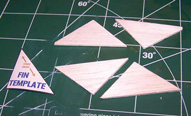 Since I was not yet ready to go to bed, I decided to cut out
the fins and try to seal them. All that is provided is a sheet of balsa and a template to cut out. SInce the fins are
simple right triangles, this did not pose too much of a problem. I cut out the template, traced the outline onto the
balsa with a pencil and cut them out with a razor knife. The template thoughtfully included a little arrow to make sure
I get the grain in the right direction.
Since I was not yet ready to go to bed, I decided to cut out
the fins and try to seal them. All that is provided is a sheet of balsa and a template to cut out. SInce the fins are
simple right triangles, this did not pose too much of a problem. I cut out the template, traced the outline onto the
balsa with a pencil and cut them out with a razor knife. The template thoughtfully included a little arrow to make sure
I get the grain in the right direction.
Since I am out of Elmer's and there is no place open at this hour, I decided to try something I have not done for a very long time. I fished a bottle of sanding sealer out of the garage and put on three coats on each side. I waited long enough between coats to where they seemed dry to the touch as I watch "Master Blasters". The sealer seemed thinner than I remembered and it may well take more coats that I thought. This ia a reflection of the sealer, not the balsa.
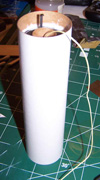 After I had gotten 3 coats of sealer
on the fins and finished shuddering at the public face of rocketry as presented on TV, I decided to end my troubles by
drinking the rest of the sanding sealer. At the last minute, I remembered that I am supposed to preach in the morning
and merely closed the lid, deciding that more benefit would accrue from installing the motor mount. I test fitted it
and found that it was neither too loose nor too tight. It was just right. I used a long swab to run a ring of glue
around the interior, pushed the motor mount part of the way in and then swabbed in another ring of glue. I then pushed
the mount in the rest of the way. The instruction make a point of emphasizing that the after bulkhead needs to be
recessed a full half inch into the BT to maintain stability. I measured it to make sure, applied a bead of glue and
called it a night.
After I had gotten 3 coats of sealer
on the fins and finished shuddering at the public face of rocketry as presented on TV, I decided to end my troubles by
drinking the rest of the sanding sealer. At the last minute, I remembered that I am supposed to preach in the morning
and merely closed the lid, deciding that more benefit would accrue from installing the motor mount. I test fitted it
and found that it was neither too loose nor too tight. It was just right. I used a long swab to run a ring of glue
around the interior, pushed the motor mount part of the way in and then swabbed in another ring of glue. I then pushed
the mount in the rest of the way. The instruction make a point of emphasizing that the after bulkhead needs to be
recessed a full half inch into the BT to maintain stability. I measured it to make sure, applied a bead of glue and
called it a night.
When I got back to work, it was time to tackle the fins. I did a bit of sanding and then cut out the body wrap designated for marking the fin lines. The fit was the most perfect I have ever had with this method. I marked the tops and bottoms of the the fin lines, removed the wrap and drew in the lines against a door.
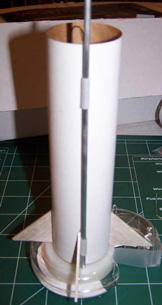 Next came the actual mounting of the fins. Being lazy,
impatient etc. I opted to use CA. A trick I learned recently is to use a safety pin to perforate the root edges and the
BT where the join will be made. This is to allow the glue to form rivets. I need a few more flight tests (catastrophes)
before I decide how effective this is but it is no trouble to do and I adopted the procedure on this model.
Next came the actual mounting of the fins. Being lazy,
impatient etc. I opted to use CA. A trick I learned recently is to use a safety pin to perforate the root edges and the
BT where the join will be made. This is to allow the glue to form rivets. I need a few more flight tests (catastrophes)
before I decide how effective this is but it is no trouble to do and I adopted the procedure on this model.
When the perforations were made, I glude the fins on with CA. In addition to the wrap around fin guide, this kit also provides a handy template against which to set the BT as the fins are place to aid in alignment. The mounting of the fins went off without a hitch.
Likewise, the launch lug presented little in the way of effort. The provided lug was sliced in half with a razor and then I put both pieces on a short length of 1/8" rod. I applied some glue to the lugs and then set them in place. The lower half goes in the crook of a fin and the upper almost at the top of the lower BT.
While the CA was setting up, I worked on the nosecone. This was a bit different from any I had worked on before. In the first place, it comes with the base hollowed out, weighted, and then filled back in to ensure stability. Judging by the sarcastic tone of the instructions, I probably could not be trusted to do this myself without endangering all around me. It does take some of the guesswork out of it and is a nice touch.
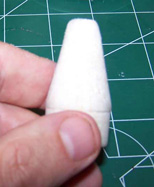 The second new thing was actually shaping the tip of the
nose cone. The directions state that if it had been done at the factory, it would have resulted in a mess as the blades
chewed the thing up. That meant that I was supposed to sand it to the right shape. That involved sanding the
cylendrical tip into a spherical tip which should be well within the skill set of a decent rocketeer. Needless to say,
it was not in my skill set. I used a sanding board and rotated the NC as I tried to remove material evenly around it.
It turned out better than I had expectedbut not as well I had hoped. For me, doing it by eye was hard.
The second new thing was actually shaping the tip of the
nose cone. The directions state that if it had been done at the factory, it would have resulted in a mess as the blades
chewed the thing up. That meant that I was supposed to sand it to the right shape. That involved sanding the
cylendrical tip into a spherical tip which should be well within the skill set of a decent rocketeer. Needless to say,
it was not in my skill set. I used a sanding board and rotated the NC as I tried to remove material evenly around it.
It turned out better than I had expectedbut not as well I had hoped. For me, doing it by eye was hard.
Now it was time to do some early finishing. The instruction say to prepare the NC by filling it with white enamel paint and putty and then sanding. The next step is to assemble, but not glue, the entire stack and paint it white. Here I decided to combine the steps and try something else I had read about. Several sources have said that Kilz spray primer in white is good for filling. I decided to try it out. I assembled the stack, took it outside and applied the first coat of Kilz. It has not yet had time to dry but I already know its going to need more. The balsa was a bit rough and still is. I'll probably shoot it with the Kilz a few more times just to see what kind of effect it has and then go back to a normal filler. Before I can do that, though, it has to dry and I need some sleep.
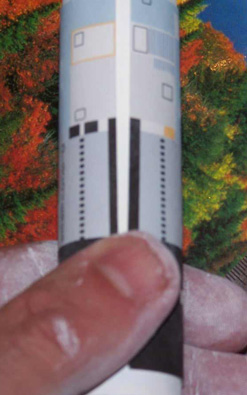 After letting the rocket dry overnight, I was surprised to
see that the Kilz had done a much better job than I expected. It completely covered the wood and grain and the only
real problem was the roughness of the balsa. It definitely needed some more filling but I was intrigued enough to want
to see how far I could go with just the Kilz. Accordingly, after a bit of sanding, I gave it another coat.
After letting the rocket dry overnight, I was surprised to
see that the Kilz had done a much better job than I expected. It completely covered the wood and grain and the only
real problem was the roughness of the balsa. It definitely needed some more filling but I was intrigued enough to want
to see how far I could go with just the Kilz. Accordingly, after a bit of sanding, I gave it another coat.
Actually, I gave it 2 more coats and was amazed. The Kilz actually did a very creditable job as a filler. I would not recommend using it as a "main" method but to fix small imperfections, it is a delight. I was certainly satisfied with the results and, after some sanding, I went ahead a sprayed on 2 coats of gloss white. Then it was time to play the waiting game again.
After waiting, I had an upleasant realization about the Kilz. The reason it works as well as it does as a filler is that it puts a lot of "stuff" out. That means that the painted rocket, especially with all those coats, has a larger diameter than would otherwise be the case. That in turn means that the beautiful wraps for the top BT do not fit.
I'll back up here and say that in the instructions, Dr. Z emphasizes that the wraps need to be carefully cut out. The kit comes with 2 and it is recommended that both be cut out and tried for taste. In both cases, I found that the wraps would not close on themselves. As a result, I spent another evening sanding through the paint and primer, almost to the BT. That improves the situation but the wrap still does not close.
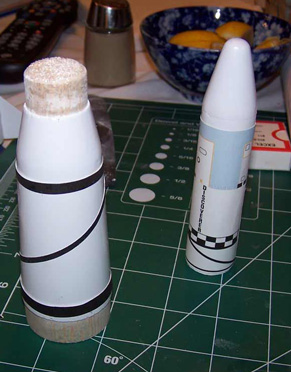 When he found out about it through a TRF post, Dr. Zooch
himself immediately sent out a replacement by priority mail. It quickly arrived and things got stranger. I laid one of
the old wraps right on top of the uncut new one. It was exactly the same size. I cut it out anyway, giving a bit of a
generous margin. I figured that if I used the one with more white and the diagonal black stripe, I could cut it down to
the exact length and make the seam less noticeable. After I made my marks, I tried it out and found that I needed to
cut back exactly to the original lines. I pulled out the original wrap and, lo and behold, it fit. All I can figure is
that I did a lot of wet sanding. Perhaps the water caused the painted BT to swell. It's either that or I am in the
Twilight Zone. I applied white glue around the periphery and laid the wrap down. It is not perfect but as close as is
possible given my current skill set.
When he found out about it through a TRF post, Dr. Zooch
himself immediately sent out a replacement by priority mail. It quickly arrived and things got stranger. I laid one of
the old wraps right on top of the uncut new one. It was exactly the same size. I cut it out anyway, giving a bit of a
generous margin. I figured that if I used the one with more white and the diagonal black stripe, I could cut it down to
the exact length and make the seam less noticeable. After I made my marks, I tried it out and found that I needed to
cut back exactly to the original lines. I pulled out the original wrap and, lo and behold, it fit. All I can figure is
that I did a lot of wet sanding. Perhaps the water caused the painted BT to swell. It's either that or I am in the
Twilight Zone. I applied white glue around the periphery and laid the wrap down. It is not perfect but as close as is
possible given my current skill set.
After the wrap was on the upper BT, I cut strips to the appropriate length from the provided section of black wrapping. One was used to wrap a diagonal line one revolution around the transition section. The other two were used to wrap around the circumference at the top and bottom of the transition. In each case, the directions indicated that a little excess would need to be trimmed and that was handled with a razor.
Another decision had to be made at this point. The instruction recommend that addition of one additional circumference of black wrapping around the top of the lower BT. This is not in accordance with the correct color scheme but is recommended to hide the sooting caused by ejection charges. I elected to give it a try. I wish I had not as the rocket looks better without it but it is not objectionable. A bit of black paint was applied to the tip of the NC and the end was in sight.
With that, the NC was glued to the upper BT. The upper BT was glued to the transition. The eyescrew was set in the bottome of the transition with a bit of white glue and the Kevlar® and elastic were tied off. The kit comes with a thin yellow plastic chute but I will be replacing it with a Thermal Rider from Hartle Engineering at the launch field.
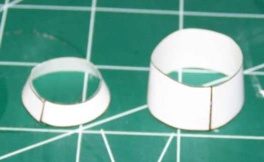 The building of the rocket nozzle is the final part of the
assembly. The instruction say that this is an optional step, basically because it is a pain in the backside. It was.
The nozzle starts out by cutting out the two wrap around pieces from the provided wrap sheet. Each is then glued into a
truncated cone using an overlay tab. Each of these steps is easy. The more difficult part comes in gluing the top cone
to the bottom cone, keeping them straight and preventing any gaps. This is accomplished slowly, patiently and with a
bit of sandpaper to knock off the rough edges.
The building of the rocket nozzle is the final part of the
assembly. The instruction say that this is an optional step, basically because it is a pain in the backside. It was.
The nozzle starts out by cutting out the two wrap around pieces from the provided wrap sheet. Each is then glued into a
truncated cone using an overlay tab. Each of these steps is easy. The more difficult part comes in gluing the top cone
to the bottom cone, keeping them straight and preventing any gaps. This is accomplished slowly, patiently and with a
bit of sandpaper to knock off the rough edges.
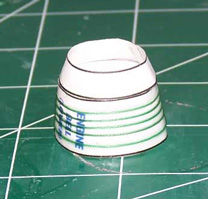 The plans call for a novel way to improve the appearance of
the nozzle. A thread is provided to simulate the banding. The process for doing this invovles tacking down one end with
CA and waiting for it to set. The thread is then wound around the nozzle in a spiral and the other end is tacked down.
The excess is cut off and then all is held in place by drizzling CA over it. This also strengthens the nozzle.
The plans call for a novel way to improve the appearance of
the nozzle. A thread is provided to simulate the banding. The process for doing this invovles tacking down one end with
CA and waiting for it to set. The thread is then wound around the nozzle in a spiral and the other end is tacked down.
The excess is cut off and then all is held in place by drizzling CA over it. This also strengthens the nozzle.
I tried this procedure and was a bit skeptical with the early results. Because I was not paying sufficient
attention, the spirals are not evenly placed. Additionally, I thought it looked kind of cheesy when I was done. I was
just about ready to scrap the nozzle or use the extra one from my extra wrap set but decided to press on. When the CA
was dried, the whole thing was painted with metalic steel.
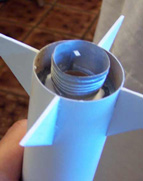 That made all the difference in the world and it really did begin to
look like a real rocket nozzle.
That made all the difference in the world and it really did begin to
look like a real rocket nozzle.
PROS: Nice looking rocket, excellent customer service
CONS: Secret agents sneak into the house in the dead of night to play mind games with the wraps.
The final step is to slip the nozzle around the protruding motor mount. This should be easy but mine was a tight fit. A little more sanding and it slipped on and was secured with white glue. Now, I think, the rocket is finished.
Finishing:
All of the finishing was covered in the previous section.
Construction Rating: 4 out of 5
 Flight:
Flight:
Dr Zooch never says much about the motors except not to wimp out with an A. That is good advice. I started out with a
B6-4. Even with those little bitty fins, it took off and flew well. The altitude surprised me, especially with all the
nose weight. It recovered well too.
Then I got stupid. There was a lot of wind blowing and I did not want to risk losing this rocket on a C. I wimped out with an A8-3. Again it took off fine but did not achieve much altitude. Deployment was a bit late but a weak ejection charge did nothing but dislodge the NC. It bounced and will need some repair work.
PROS: looks good and flies well
CONS: I wimped out with an A
Flight Rating: 4 out of 5
Summary:
This was a fun build that was occasionally frustrating as I tried to learn some new skills but it was untimately
rewarding. Dr. Z cutomer service is first rate as well.
Overall Rating: 4 out of 5
 |
 |
Flights
 |
 |
Sponsored Ads
 |
 |













J.R. (July 22, 2008)